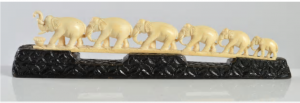Ivory trade in Australia – a matter of life and death
Articles / January 2021

Australia has had a ban on ivory imports since 1990, however it remains legal to buy and sell ivory items domestically. No matter where one stands on the issue of killing animals for anything, killing an elephant for something that will end up purely as decoration, creates a certain queasiness.
In 2019, the Australian Parliament’s law enforcement committee’s report following its inquiry into the Trade in elephant ivory and rhino horn recommended a near total ban on the practice of selling ivory with only some exemptions, including antiques and pianos with ivory keys made before the 1970s. During its inquiry, the committee was informed by the International Fund for Animal Welfare (IFAW), that 20,000 to 50,000 elephants were being killed for their ivory each year.
A government delegation to the 18th summit of the Convention on International Trade in Endangered Species (CITES) in Geneva confirmed that Australia was moving towards legislating a ban on sales for any ivory that fell outside a narrowly defined group of exemptions, but how and when this legislation will be implemented currently remains unfinalized.
The United Nations Office on Drugs and Crime has said that it is difficult to assess just how much the illegal trade of ivory and rhino horn is worth, but the broader illegal wildlife market is worth up to $23 billion a year.
Advocates for outlawing the trade have suggested Australia’s acceptance of domestic ivory trade has fuelled the poaching of endangered elephant species overseas and are concerned that local buyers view products sold in Australia as legitimate. However, Australia considers international trade is in strict compliance with CITES regulations.
If you do have ivory items you want to buy or sell, you should have them valued and confirmed by an NCJV registered valuer that they are actually ivory. Also, you should check all documentation carefully to ensure the product is lawfully in Australia.
A ‘Wildlife Statutory Declaration’ form was developed by the Australian Federal Government in consultation with the auction industry to show provenance for domestic sales. This form is not mandatory but can help set out the provenance of regulated wildlife items that are offered for domestic sale by auction houses. The form should be accompanied by evidence of lawful import, based on the age and origin of the item, which could include:
Some auction houses have chosen to stop trading in ivory and rhino horn. Leonard Joel did this in 2016, and no longer buys or sells carvings, figures, jewellery, walking sticks, billiard cues, picture frames and ivory handled knives or raw and carved tusks. IFAW considers this was a significant stance by Leonard Joel and sees it as important to have private auction houses as partners and advocates to its organisation.
In recent years, countries such as the United States, China and the United Kingdom have introduced legislation to ban the domestic trade in elephant ivory, despite significant resistance from the antiques trade. One would think if they can do it, so can Australia.
Author:
Jillian Langford NCJV Registered Valuer (Qld) FGAA. GG. BA (Hons) LLB
Find A Valuer
Get connected, stay up to date and build your Business
Become A Member
Your membership has expired.
Please contact NCJV to renew
your membership.